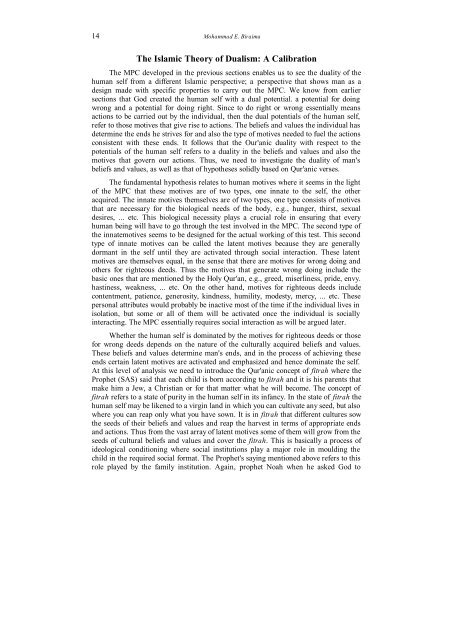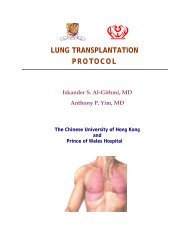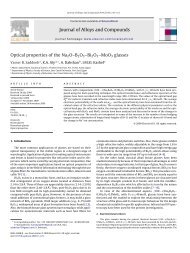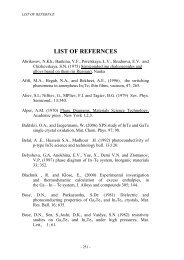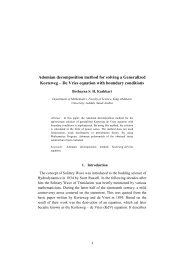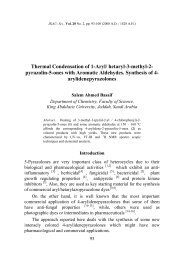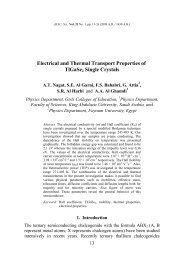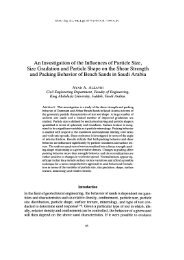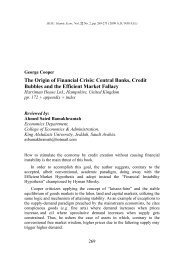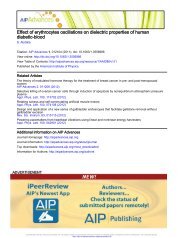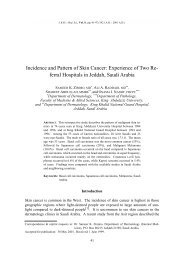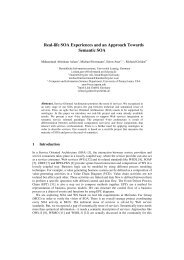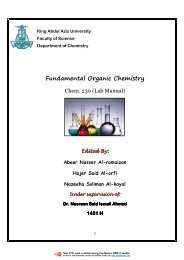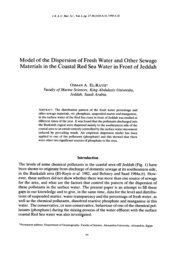A Qur'anic Model for a Universal Economic Theory
A Qur'anic Model for a Universal Economic Theory
A Qur'anic Model for a Universal Economic Theory
Create successful ePaper yourself
Turn your PDF publications into a flip-book with our unique Google optimized e-Paper software.
14 Mohammad E. Biraima<br />
The Islamic <strong>Theory</strong> of Dualism: A Calibration<br />
The MPC developed in the previous sections enables us to see the duality of the<br />
human self from a different Islamic perspective; a perspective that shows man as a<br />
design made with specific properties to carry out the MPC. We know from earlier<br />
sections that God created the human self with a dual potential. a potential <strong>for</strong> doing<br />
wrong and a potential <strong>for</strong> doing right. Since to do right or wrong essentially means<br />
actions to be carried out by the individual, then the dual potentials of the human self,<br />
refer to those motives that give rise to actions. The beliefs and values the individual has<br />
determine the ends he strives <strong>for</strong> and also the type of motives needed to fuel the actions<br />
consistent with these ends. It follows that the Our'anic duality with respect to the<br />
potentials of the human self refers to a duality in the beliefs and values and also the<br />
motives that govern our actions. Thus, we need to investigate the duality of man's<br />
beliefs and values, as well as that of hypotheses solidly based on <strong>Qur'anic</strong> verses.<br />
The fundamental hypothesis relates to human motives where it seems in the light<br />
of the MPC that these motives are of two types, one innate to the self, the other<br />
acquired. The innate motives themselves are of two types, one type consists of motives<br />
that are necessary <strong>for</strong> the biological needs of the body, e.g., hunger, thirst, sexual<br />
desires, ... etc. This biological necessity plays a crucial role in ensuring that every<br />
human being will have to go through the test involved in the MPC. The second type of<br />
the innatemotives seems to be designed <strong>for</strong> the actual working of this test. This second<br />
type of innate motives can be called the latent motives because they are generally<br />
dormant in the self until they are activated through social interaction. These latent<br />
motives are themselves equal, in the sense that there are motives <strong>for</strong> wrong doing and<br />
others <strong>for</strong> righteous deeds. Thus the motives that generate wrong doing include the<br />
basic ones that are mentioned by the Holy Qur'an, e.g., greed, miserliness, pride, envy.<br />
hastiness, weakness, ... etc. On the other hand, motives <strong>for</strong> righteous deeds include<br />
contentment, patience, generosity, kindness, humility, modesty, mercy, ... etc. These<br />
personal attributes would probably be inactive most of the time if the individual lives in<br />
isolation, but some or all of them will be activated once the individual is socially<br />
interacting. The MPC essentially requires social interaction as will be argued later.<br />
Whether the human self is dominated by the motives <strong>for</strong> righteous deeds or those<br />
<strong>for</strong> wrong deeds depends on the nature of the culturally acquired beliefs and values.<br />
These beliefs and values determine man's ends, and in the process of achieving these<br />
ends certain latent motives are activated and emphasized and hence dominate the self.<br />
At this level of analysis we need to introduce the <strong>Qur'anic</strong> concept of fitrah where the<br />
Prophet (SAS) said that each child is born according to fitrah and it is his parents that<br />
make him a Jew, a Christian or <strong>for</strong> that matter what he will become. The concept of<br />
fitrah refers to a state of purity in the human self in its infancy. In the state of fitrah the<br />
human self may be likened to a virgin land in which you can cultivate any seed, but also<br />
where you can reap only what you have sown. It is in fitrah that different cultures sow<br />
the seeds of their beliefs and values and reap the harvest in terms of appropriate ends<br />
and actions. Thus from the vast array of latent motives some of them will grow from the<br />
seeds of cultural beliefs and values and cover the fitrah. This is basically a process of<br />
ideological conditioning where social institutions play a major role in moulding the<br />
child in the required social <strong>for</strong>mat. The Prophet's saying mentioned above refers to this<br />
role played by the family institution. Again, prophet Noah when he asked God to


